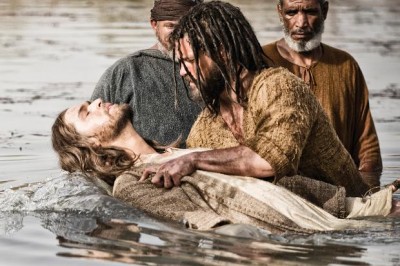
Atheist and critics alikes are perplexed by the overwhelming success of the new TV series The Bible, that became the cable TV’s most-watched telecast of the year on its March 3rd premiere on History channel, pulling in $13.1 million viewers, with its next two episodes holding strong at 10.9 million, in spite of an incoherent narrative, wooden dialogue, mediocre acting and cheap-looking special effects.
The producers of the show, British-born Mark Burnett (the producer of reality shows Survivor, Celebrity Apprentice, The Voice and Shark Tank), and his wife Roma Downey (who plays Virgin Mary), admitted that it was a low budget production and that their goal was merely to alleviate “Bible illiteracy.” The results of their efforts, however, didn’t impress either TV critics or Bible scholars, who accused the producers of presenting a misconceived vision of the Bible in order to please the Christian evangelicals, casting white Americans and Europeans for the roles of the ethnically-mideastern prophets and black actors in the roles of Satan and Samson.
Regardless of the educational and production merits of The Bible, the above rating figures have prompted ungodly Hollywood to reassess its relationship with God and recognize his power in the box-office and TV rating. “We believe the audience continues to have a hunger for life -and faith- affirming films,” said Michael Langdon Jr. who is writing and producing the new TV version of Jesus of Nazareth. “The monumental success of Mark Burnett and Roma Downey’s The Bible just underscores that.”
To feed the masses’ hunger for faith-based stories, several TV channels are offering a feast of godly shows. Showtime is developing The Vatican, Lifetime has a hit reality series called the Preachers’ Daughters, GSN is airing a Bible themed game show and several networks (TLC, Discovery, National Geographic) have sparked to the Amish.
More religious-themed movies will also hit the big screen soon, most notably Darren Aronofsky’s epic Noah, starring Russell Crowe. The film has already stirred devout christians to condemn it for not being in line with the Biblical account of Noah’s ark and the flood. This kind of controversy is inevitable when it comes to faith-based movies, for everyone has his own interpretation of the word of God. In 2004, Mel Gibson was accused of anti-semitism for depicting the Jews as the persecutors of Jesus in The Passion of The Christ, though he insisted that he had faithfully adhered to the Gospel.
Unfortunately, such arguments have sometimes spilled blood instead of ink, as was the case with the Dutch filmmaker Theo van Gogh, who was assassinated in 2004 for making a short movie, Submission, in which he showed text from the Quran superimposed on women’s naked bodies. Nonetheless, filmmakers are undeterred. In fact, two epic movies about the prophet Muhammad are currently in production: one in Iran and the other in Qatar. The two movies are bound to incite controversy and probably bloodshed, considering that one is a Shiite version and the other is a Sunni one.
Filmmakers often hire theologians and historians to help in their endeavour to tell their divine stories with the utmost veracity and without hurting the feelings of the faithful, but in vain. Faith, after all, is a belief that is held with lack of, in spite of or against reason and evidence, hence any attempt to rationalize it is futile.
Some would argue that since the dawn of history, religion has been a source of conflicts and adversity that lead to the perishment of millions of souls, destruction of prosperous nations and annihilation of great cultures. The faithful however, would certainly contend that religion has brought harmony where there was a discord, an order where there was chaos and enlightenment where there was ignorance. The gap between these two statements seems too wide to ever be reconciled, however hard filmmakers try.
